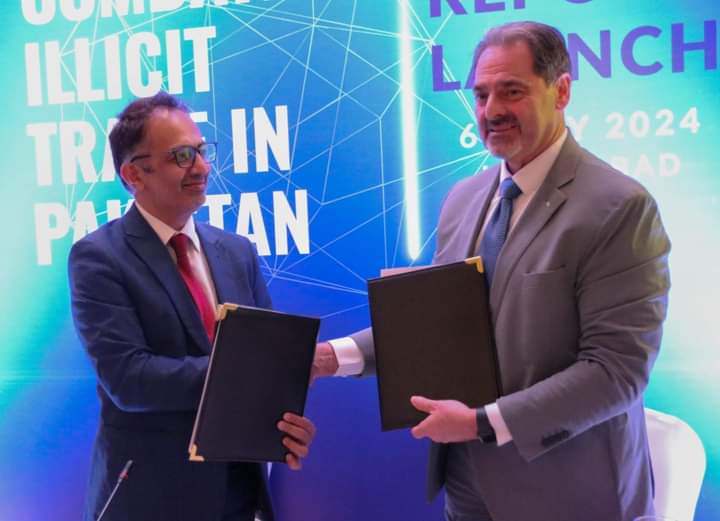
TRACIT warns Pakistan that counterfeiting and illicit trade stifle growth, economic development
Islamabad – “Record high inflation is perhaps the most pressing problem,” said TRACIT Director-General Jeff Hardy. “When prices rise faster than incomes, illicit and black-market products become more tempting to consumers desperately cheaper alternatives.”
These illicit markets have plagued the country for years – perpetuating a vicious circle of associated money laundering, organized crime, corruption, and tax evasion,” said Mr. Hardy. “We are pleased that the government is stepping up law enforcement against smuggling, money laundering and black marketers.”
Improving enforcement and tax collections can help mobilize domestic revenues without the need to raise taxes, which could stifle growth and the fragile economic recovery,” said Mr. Hardy. “Additional revenues resulting from tighter compliance with existing taxes and track and trace systems can help preserve economic stability and enhance debt sustainability.”
Dr Ali Salman explained that “the 68 Billion Dollar black and gray markets are fueled by high taxes, tariffs and duties, because in these times of crippling inflation, citizens have nowhere else to go”.
He said, “Unless we minimize barriers to legal trade, the government of Pakistan has no chance of generating enough growth to raise required tax revenues and is set on a clear path towards bankruptcy”.
In Pakistan, the shadow economy is already equal to about 40 percent of GDP and significant levels of illicit trade can be found in many key economic sectors, including food fraud, illicit petroleum pesticides, counterfeiting, and trade in falsified and substandard pharmaceuticals. Discussants at the forum delineated the challenges faced in tackling illicit trade across sectors.
It is estimated that 40 percent of the medicines sold in the country are counterfeit or substandard. Illicit trade in pharmaceuticals will need to be addressed from different angles, including amending the existing regulatory framework and undertaking aggressive law enforcement measures.
Manufacturers of illicit pesticides have recently been the target of government investigations, with recent seizures of large quantities of illicit pesticides and fertilizers worth millions of rupees. Efforts by the Department of Plant Protection (DPP) to establish a special anti-pesticide adulteration campaign can usefully shut down the production and distribution of illicit pesticides and can also improve agricultural production and economic development.
More than half of the cigarettes consumed in Pakistan are sold without the payment of taxes, leading to annual losses of tax revenues of around USD 860 million.
Dr Ali Salman highlighted that “Smuggling is growing faster than legal trade and presently stands at 20% of GDP, indicating that formal markets are unable to meet the increasing demand of the Pakistani middle class. who are willing to take high risks to avoid the excessive cost of taxes and tariffs.
TRACIT and the Prime Institute also signed a Memorandum of Understanding establishing a framework for cooperation to mitigate illicit trade in Pakistan.
The Transnational Alliance to Combat Illicit Trade (TRACIT) presented policy recommendations to government officials and industry stakeholders participating in a forum hosted by Pakistani think tank, the Policy Research Institute of Market Economy. The report highlights the impact of Pakistan’s ongoing economic problems with a staggering 25 percent inflation rate. High levels of inflation have had a disastrous impact on consumer purchasing power and product affordability, which is widely regarded as the primary driver for illicit trade.